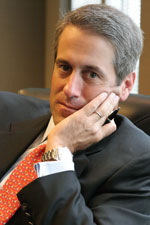
By Steve Strang, founder and publisher of Charisma magazine and a supporter of Mike Huckabee for president
As a Christian, my faith is the most important thing in my life. It defines where I work, the friends I have, who I married and the values I cherish.
I’m pro-life not because it’s a nice public policy to support but because my Christian faith says all innocent life should be protected. I support traditional marriage not because I happen to be heterosexual but because the Bible teaches that marriage is designed by God to be a lifelong union between a man and woman.
My faith forms my total outlook on life. So when it comes to deciding what political candidates to back, my faith enters my decision-making process. And why not? Faith colors everything else in my life.
Yet with the constant drumbeat of secularism emphasizing separation of church and state, somehow it seems out of bounds to let one’s faith determine how he’ll vote.
Yet people vote for all sorts of reasons—some important, some silly.Sometimes voters simply rely on a “gut feeling” that the candidate is the best choice. Sometimes it’s for pragmatic reasons—they accept a candidate who barely matches their values because the one who does match their values seems like a long shot to win.
Others may choose because they think a candidate is more intelligent or more experienced. Those qualities are important. I want elected officials who have the intelligence and skills to handle the job. That’s just common sense.
But what good is intelligence or experience if the candidate has no moral values? I believe values affect everything else about a candidate. I want an intelligent candidate with unwavering core values—a candidate who does not change his or her morality because of politics.
Values form the basis for the policies that a candidate will support in office. Values steer what political appointments are made or how decisions are reached.
So I look for my values in the candidates I support, whether they are running in local, state, or national elections. Often, no candidate matches what I would like to see in a leader. In that case I look to see if his or her values are more or less in line with mine based on their statements or policies.
Sometimes I don’t like either candidate, and I must settle for the “lesser of two evils.” But if I find a candidate whose values are like mine and to whom faith is an integral part of his value system, I get excited and support that candidate enthusiastically—as I have former Arkansas Gov. Mike Huckabee in this year’s Republican presidential primaries.
I love what Huckabee says: “Faith doesn’t just influence me, it really defines me. I don’t have to wake up every morning wondering what I need to believe.”
I don’t support Huckabee because of his denominational background. He’s a Southern Baptist and I’m a Pentecostal. Both Jimmy Carter and Bill Clinton were Southern Baptists like Huckabee, and I didn’t support them. While I hope both of those men are sincere believers, their faith doesn’t seem to affect their policies—especially when it comes to the sanctity of life, which I consider the bedrock issue. How we chose to value life as a culture defines everything else about us.
I can support a man who believes what Jesus Christ taught: “Do unto others as you would have them do unto you” (Matthew 7:12). I can support a leader whose policies while he was governor helped the poor while maintaining fiscal responsibility. Huckabee served tens of thousands of Hurricane Katrina refugees who fled to Arkansas for help. His ARKids First program provided health insurance to children of underprivileged Arkansas families. Yet Huckabee also turned a $250 million deficit into an $800 million surplus during his Little Rock years.
There are many people who share my faith and values, but I would never support them for public office if they aren’t qualified. Yet Huckabee is not simply a member of my evangelical culture. He has also gained the important executive experience necessary to govern skillfully, handle any crisis and solve huge problems as governor of Arkansas for 10 years.
I have never believed in a candidate more strongly that I believe in Mike Huckabee. I am impressed by the way his faith affects his policies. While that quality doesn’t appeal to many–especially not to secularists, who seem wary of anyone with firm values based on faith– it makes Huckabee appealing to millions like me. The “Hucka-surge” we’ve seen in recent weeks wasn’t caused by the entrenched power structure. It came from the grassroots.
I’m encouraged that Huckabee may actually win the GOP nomination and be elected. But if nothing else, his candidacy and the recent surge has let party leaders and the media know that there are millions of Americans just like me who won’t support someone just because they have raised a lot of money or are backed by the party or media elites or even that they appear “electable.”
We won’t even back someone just because of religion. That’s because religion alone isn’t the issue—it’s the candidate’s value system, which arises out of his or her religious faith.
An award-winning journalist and entrepreneur, Steve Strang was named in 2005 by TIME magazine as one of the 25 most influential evangelicals in America.
More from Beliefnet and our partners

